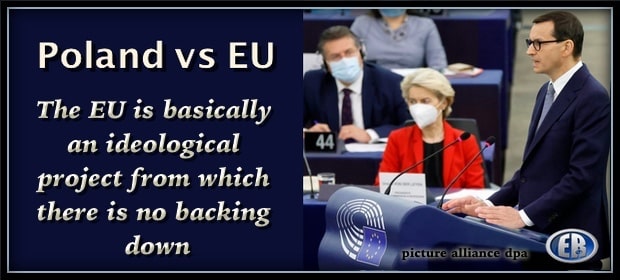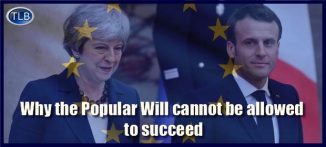
ER Editor: Here we have notes on The Duran team’s Live Show discussion on what’s going on between Poland and the European Union. Alexander Mercouris offers us some very useful facts, insights and historical perspective.
Who’s Creating the ‘Polexit’ narrative? Who’s in the stronger position?
- Christoforou: Recently, there was a meeting between the Polish PM Mateusz Morawiecki and the EU, with Merkel present. The PM gave an incredible 30-minute speech before the EU Parliament (see featured image). Von der Leyen also gave a mere 5-minute speech where we can see the opposition playing out.
- How likely is a Polexit? Or is this just a phase of negotiations between the two?
- Mercouris: Poland has been very accommodating with the EU, but not so the EU with Poland. With every Polish compromise, the EU has wanted more. And that’s the basic roadblock. Poland probably isn’t in a position to give anymore. Merkel is signalling this to the EU, too, requiring the EU to meet Poland halfway.
- At the moment, it’s the battle between the EU, the irresistible force, and Poland as the immovable object. The Polish PM’s speech in the EU parliament was met with incredible hostility. The issue is the supremacy of law, which Poland so far isn’t prepared to back down on. The EU has shown zero capacity to compromise or negotiate. The EU DOESN’T negotiate: it sets out terms and expects the other side to back down. It’s done that with Ukraine and Russia on many issues. It did it with the UK over Brexit, getting the hardest Brexit deal possible as a result, and now Poland. The EU is an IDEOLOGICAL project, about setting up a centralized super state. Which is why it stresses the supremacy of its own law. If it gave in, it would be the end of it ideologically. The EU is also a conglomerate of people, which means that it negotiates all the time with ITSELF before it negotiates with another party. It’s always the hardliners and ideologues who crystallize the position on any topic. Then it becomes impossible to shift position for a 3rd party such as Poland. Russia recently found this out over Ukraine: Merkel and Macron tell Putin what they want over Ukraine, then von der Leyen comes along and says something different. Then Merkel and Macron give in to von der Leyen’s position. That’s how it works. Yanis Varoufakis discovered the same thing when as Greek economics minister he tried to negotiate with the EU back in 2015. Brexit had the same negotiation problems.
- Why is Merkel taking the stand she is? First, Germany has particular economic and financial interests – and Merkel has never tried to irritate the German business class. She’s not out of politics, so she still has an interest in pleasing them. Many Germans have opened factories in Poland so the entrepreneurs have a financial interest in Poland. They don’t want to see a Polexit, which would wreak havoc with their supply chains. Further, for some Germans, especially older Germans and those in the East, having a country on their eastern border NOT part of the EU conjures up historic nightmares. It’s not to be underestimated. So Polexit for Germans means no partner on its eastern border. Germany’s been trying to consolidate the EU around itself. Merkel falls into this class as being an older, eastern German.
- Among the Greens and social democrats, there is less concern about these things. They are much more likely to take a hardline stance against Poland so that they can impose their green policies on everybody in the EU system.
- Merkel represents a more traditional German policy, but it’s likely to end with her.
- (Christoforou) EU typically forces countries to do things along two lines: 1. by being part of the euro system, such as Greece and Cyprus, and being forced to receive its austerity measures. They create fiscal difficulties for them by cutting off their supply of euros at the ATM machines, or applying capital controls as to how much money can be taken out. Euro liquidity is usually shut off to the banks and their customers, which can easily crush an economy. Poland can avoid this because it’s not in the euro. 2. In Poland’s case, the EU will likely withhold EU funds – Covid recovery slush funds or structural funds – to get compliance. Morawiecki has said ‘no chance, bring it on’. These funds would be useful for Poland but it isn’t in desperate need of them. But Poland CAN do something existential to the EU if it continues to hunker down in its current position. In this war, Poland may have more leverage. Mercouris: Yes, but it comes down to the question of whether Poland is prepared to do this.
- (Mercouris) Poland is NOT in the eurozone, so it would be much more difficult for the EU. Withholding structural and Covid recovery funds wouldn’t have the same effect as withholding euros at the ATM machines. This wouldn’t crush the economy as would stopping liquidity to the country’s banks. Poland does have tools it can use, and has an ally in Orban of Hungary. Poland could start using the power of veto aggressively at the level of the European Council and at the level of the Council of Ministers. Very quickly, the entire working of the Union might break down where budgets can’t get passed, etc. Day to day stuff can be made difficult to impossible. De Gaulle once did this, by aggressively using veto power to pursue French interests. He was successful. But de Gaulle was fully in control of France and pursued a policy that was popular at home. Poland is not in the same situation. It doesn’t have ministers of de Gaulle’s stature, and it doesn’t have a unified Poland behind them. Many Poles would probably support the EU in this quarrel. Further, the EU could gain the upper hand by using the Russian bogeyman strategy. “Look, we protect you from the Russians” says the EU. “If we throw you out, the Russian bear will come and eat you up.” This has no basis in reality, but many Poles would believe this, including govt ministers who have used this stance before. Poland has been very anti-Russian historically, so they are now exposed to this anti-Russian argument used by the EU. It carries traction in Poland. Poland has lots of tools; the EU is in a weaker position relative to Poland than it was to Greece. But Poles may not be prepared to use these tools and maintain a really firm stance.
- How much does Poland receive from the EU? 121 bn euros? It could be true over the entire period of time it’s received EU funding. This funding could have really helped Poland, but also western financial support overall has been crucial. When Poland left the Soviet Union behind in the 80s, its debt was written off. It was given huge financial assistance to abandon Russia. So western aid in its totality has been important. But the pressure on Poland is much more psychological as it’s less dependent on this funding. It might, for example, be harder for them to look east for trading partners. Overall, Poland has cards up its sleeve, plus there is no mechanism to expel them. So it could do what de Gaulle did in the 60s – play tough and perhaps win. But psychologically it might be difficult to do this. Poles could be divided; and the EU combine is implacable until it gets its way.
- The ‘Polexit’ position is more being played by the EU, NOT Poland. EU puppet media channels are brandishing this idea, perhaps to divide the Polish citizenry. They know that there is a split in the population supporting the Polish Law and Justice party. They could be using this idea to scare off Poles from the L&J party. It’s a phoney narrative. Poland has said it won’t leave the EU and the EU can’t compel them. The EU can impose domestic sanctions against them, and suspend its rights on the EU Council, but Hungary will support Poland. EU strategy IS to divide Polish society and render them afraid of Russia.
- Polexit is worse for the EU than Brexit: if Poland sticks to its guns over its laws, then the EU can’t function as a super state anymore. Other countries will follow. Its law won’t be supreme. And if Poland starts to interfere in daily decision-making with its veto power, then that’s much more troublesome than Brexit because the EU can’t do its business. Poland is much more dangerous for the EU. They would actually PREFER that Poland leave than remain in the EU and create trouble.
- It’s not really a crisis: it’s the EU making it into a crisis. Because von der Leyen, the puppet, won’t allow the Polish judiciary to put its constitution above EU law (thereby creating an existential threat to the EU super state notion). But it’s not really a big deal. Poland will follow its own constitution, period. That’s it. But it’s the EU that’s making a drama out of this. Especially at the risk of contagion. The EU wants FULL CONTROL of all countries – monetarily, legally and eventually militarily. It’s only a crisis if you have an ideological project. Which the EU does.
- Why can’t the EU accept that in some areas, countries do their own thing in terms of laws and constitutions, whereas in other domains like trade, overarching EU rules operate. But it’s not the EU we’re talking about! It perceives itself as a super state. So any rebellion is seen as a drama. Hungary and Slovakia might do the same thing, putting their laws above EU law. Why not have a community of SOVEREIGN states?! The EU hates this word. As ideologues, they are uncompromising.
- If Trump were still president, would Poland’s position have been stronger? Mercouris: yes. The situation would be completely different. Biden is allied with EU hardliners.
Source
************

••••
The Liberty Beacon Project is now expanding at a near exponential rate, and for this we are grateful and excited! But we must also be practical. For 7 years we have not asked for any donations, and have built this project with our own funds as we grew. We are now experiencing ever increasing growing pains due to the large number of websites and projects we represent. So we have just installed donation buttons on our websites and ask that you consider this when you visit them. Nothing is too small. We thank you for all your support and your considerations … (TLB)
••••
Comment Policy: As a privately owned web site, we reserve the right to remove comments that contain spam, advertising, vulgarity, threats of violence, racism, or personal/abusive attacks on other users. This also applies to trolling, the use of more than one alias, or just intentional mischief. Enforcement of this policy is at the discretion of this websites administrators. Repeat offenders may be blocked or permanently banned without prior warning.
••••
Disclaimer: TLB websites contain copyrighted material the use of which has not always been specifically authorized by the copyright owner. We are making such material available to our readers under the provisions of “fair use” in an effort to advance a better understanding of political, health, economic and social issues. The material on this site is distributed without profit to those who have expressed a prior interest in receiving it for research and educational purposes. If you wish to use copyrighted material for purposes other than “fair use” you must request permission from the copyright owner.
••••
Disclaimer: The information and opinions shared are for informational purposes only including, but not limited to, text, graphics, images and other material are not intended as medical advice or instruction. Nothing mentioned is intended to be a substitute for professional medical advice, diagnosis or treatment.




